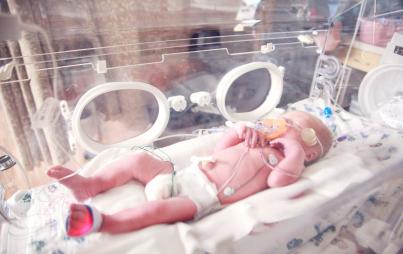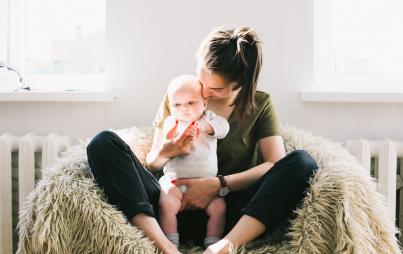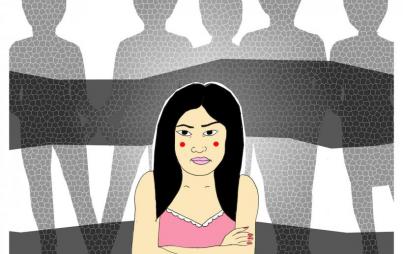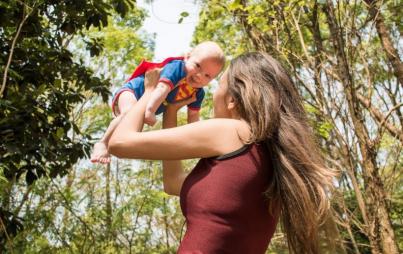
Mom’s aging, my schedule, my son’s cooking (my cooking!), our health, our lives — and the list unfurls like a dropped ball of yarn, rolling out of reach.
This article first appeared on Role Reboot and has been republished with permission.
My son likes to cook. In kindergarten he invented a chewy, chocolate chip sheet cake, softened with milk and sweetened with honey, that’s become a staple in our family, and then followed it up with a couple cookie recipes, riffs on classic chocolate chip and peanut butter. Now a third grader, he’s standing at the stove scrambling eggs just like his dad taught him. He sets the pan on the flame and adds a pat of butter, then goes to the cupboard for a bowl and to the fridge for an egg. By the time he circles back to the stove, the butter has melted; he lifts the pan and tips it in a slow swirl, then sets it gently down, cracks his egg into the bowl, and gives it a little scramble before pouring it slowly into the pan. I love watching him, love every aspect of this scene: that he learned from his dad; that he’s cooking his own breakfast; that he approaches it all with such care.
But it doesn’t last. “I don’t like cracking eggs,” he admits. “It’s too messy.” He doesn’t like the unpredictability of the crack. You tap an egg against the counter but where exactly will it crack, and how long a crack will form? Will the egg come spilling right out? Will it bring fragments of shell with it? Will the membrane catch and hold inside? He likes order and routine and control. The best thing is what happened before, the best meal is one that he’s already eaten. Am I a good mother for him because I feel the same way? Or should I push harder for us both? Eggs are a challenge. We go awhile longer with me cracking the eggs for him, but then he abandons them for cold cereal, avocado toast, an apple sliced and spread with almond butter –assembling, not cooking.
Not that I’m in any position to judge. He does homework while I start dinner; I pause as he tells me what the pharaohs took to their geometric graves, then again to glance at my email. There’s one from my dad looking for recipes, frustrated with my mom’s shrinking appetite and unpredictable palate. His worry seems to rise from my phone like steam and then I realize, Oh! The rice has boiled over and the vegetables are shriveling in a dry, burning pan. My husband puts his hands on my shoulders and moves me away from the stove; I email my dad some pasta ideas and book a flight east to cook and pack for my parents.
Soon, they will move from the house they build in rural Connecticut into an assisted-living residence near my family in San Francisco. Everything about this transition feels correct — they made the plan, acknowledging Mom’s declining health; they are strong enough to make the move; they liked two of the 12 communities I scouted for them, and so could make their own choice—but it doesn’t yet feel good. I will miss their house, despite its population of uninvited mice and ladybugs. I will miss clumps of daffodils blooming bright against gray stone walls in the spring, and fallen leaves frozen into the pond in winter. I will miss watching my boys walk down to the garden or orchard with their granddad and guessing what they will carry back to the kitchen: sweet, knobby apples; red potatoes with clumps of dirt still clinging; small green heads of broccoli with the occasional pale worm curled in their florets.
But once I arrive, I stop my sad reminiscing and focus. I cook and stock my parents’ freezer. I sort, pack, and label. I drive loads to Goodwill (a 45-minute drive), the hospital consignment shop (20 minutes), and the library (15). I set some things aside for an auction house, some for my siblings, and others for cousins. I winnow my mom’s entire book collection in one evening, presenting a shelf at a time for her thumbs up or down; behind one shelf, I find a mouse has stored his winter’s supply of acorns. Sorry, mouse, I think as I sweep his pantry into the trash.
Then it’s back to the kitchen, where I fill containers with lasagna and casserole and soup, but mostly I beat eggs into endless quiches, soft and easy to eat, stuffed with vegetables from Dad’s garden and poured into whole wheat crusts rolled out with my Mom’s old maple rolling pin, its red-painted handles faded from years of use. I’m going for high-calorie quantity and freezability here; the cooking feels utilitarian, purposeful. I wrap, label, stack, and then close the freezer on over a dozen meals.
I consider the cliché — you have to break a few eggs to make an omelette — in light of my son and my parents.
My son would prefer to scramble without any cracking and so, too, would I prefer to pull off my parents’ move without any fuss or mess. Just float them out to San Francisco and present them with their new home: smaller, but with their same pineapple-stenciled curtains; those old familiar curtains, a story in themselves for me to clean, press, tailor, flameproof (with certification from the fire department inspector), and rehang on newly-installed hardware. Instead of a dirt road and maple trees, the curtains frame a view of busy 19th Avenue and, if you stretch up on tiptoes and the fog has cleared, a glimpse of the Golden Gate Bridge.
I hire someone to help sort, donate, pack, and finally ship the things my parents want in San Francisco but she, too, is preoccupied by her aging parents and can’t give this job her full, professional attention. She and I email back and forth, exchanging lists and spreadsheets, but still things fall through the cracks. Literally. Glasses are broken. A set of 12 Japanese plates – all I really craved from my parents’ things – arrives, missing three, and I cry as I unpack, searching through the box, knowing it’s empty but still hoping maybe somehow this last crumple of tissue paper will solidify into pottery. My priorities are foolish, I know; my parents are fine, and when Mom walks in the door for the first time she says, “It looks like home.” I exhale for the first time, it feels, in months.
You Might Also Like: My Mom's Doctor Said She Was "Just Stressed Out." She Had Cancer.
A few days later, leaving their apartment after a visit, I start down the hall and pause, disoriented. A faint institutional whiff of carpet cleaner and canned pears hits me powerfully and makes me homesick for my parents, even though they are just steps away. I make it down to the car and drive home but can’t shake the odd feeling. As I fall asleep that night, my back hurts and I think I’ve strained it lifting boxes.
I’m woken by my ribs cinching tight, my breathing constricted and my heart racing. I climb out of bed trying to leave the feeling behind, only to fall to my knees in a faint. My husband, alarmed, helps me up and back into bed where I sob and gasp. Eventually my heartbeat slows. I can breathe. I can sleep.
In the morning, I consult Dr. Google and realize I’ve had a panic attack.
In my sleep? This seems absurd and cruel. How unfair that the stress simmering beneath the thin shell of my skin can bubble up and grip me so hard.
But then it happens again. I’m driving Dad across the new Bay Bridge, remarking on the structure’s gleaming white cables, the roadway low on the water, when I feel it all fall away beneath me. My hands clench the steering wheel to keep afloat. Dad doesn’t notice my pinched tone and grip, and once we’re off the bridge I exhale. And then a third time, at the cathedral for evensong, I glance up the nave and the soaring tower dizzies me. I tilt my head down, eyes closed as if in prayer, no one close enough to notice my hands, white-knuckled, gripping tight to the edge of the pew so that I don’t fall.
Mom and Dad have lived here a year. Their house and land in Connecticut sold. We are planning a vacation together. I drive them to the gerontologist, the eye doctor, the hearing aid specialist, the neurologist, the memory and aging clinic, the physical therapist, for checkups, blood work, a flu shot, an MRI, an EEG. I take them to church and then bring them over for lunch afterward. I can cook differently for them here, fresh meals that don’t need to survive the freezer, but I still often serve a familiar quiche.
One morning I drive over to take Mom to physical therapy and wait, and wait. I hesitate to call, afraid the phone will ring just as she’s walking out the door and she trips and falls in her rush to answer. I hesitate to head up stairs, afraid I’ll miss her coming down the elevator. The minutes tick by —now we’ll certainly be late — and I decide to race up. She forgot, but she readies herself deliberately while I call the therapist. I know we don’t need to rush — certainly these patients are late all the time — but I can’t help myself. On the drive, I will the stoplights to green, will the pedestrians to cross more quickly, will the driver backing carefully out of the parking space to make way for me. Taking Mom by the elbow, I guide her from the car to the entrance, paying more attention to her footing than to my own, and slam my head into a low tree branch. I reel, catch my balance, never letting go of Mom. The physical therapist greets me with concern, fetches an ice pack, and I can’t catch her eye lest the tears brimming in my eyes overflow. “I’m OK,” I signal with a nod. “I’ll be OK.”
After Mom’s appointment, my head throbbing, I struggle to hold it together while I drive her home. She reaches out and touches my shoulder. “Oh, Caroline,” she murmurs. “I’m sorry. I’m so sorry.” How long has it been since she’s had a chance to mother me? We continue without speaking, her hand on my shoulder, comforting me.
I think of all the things I’d like to control — mom’s aging, my schedule, my son’s cooking (my cooking!), our health, our lives — and the list unfurls like a dropped ball of yarn, rolling out of reach.
But sitting in the car with Mom, I start to feel a shift in perspective, as if the crack on the head has shaken something loose in me. I’m not Zen enough to let it all go; I’d still like less mess. But it’s a start. And when I get home, I call out to my son and suggest we cook some eggs.
More From Role Reboot:








